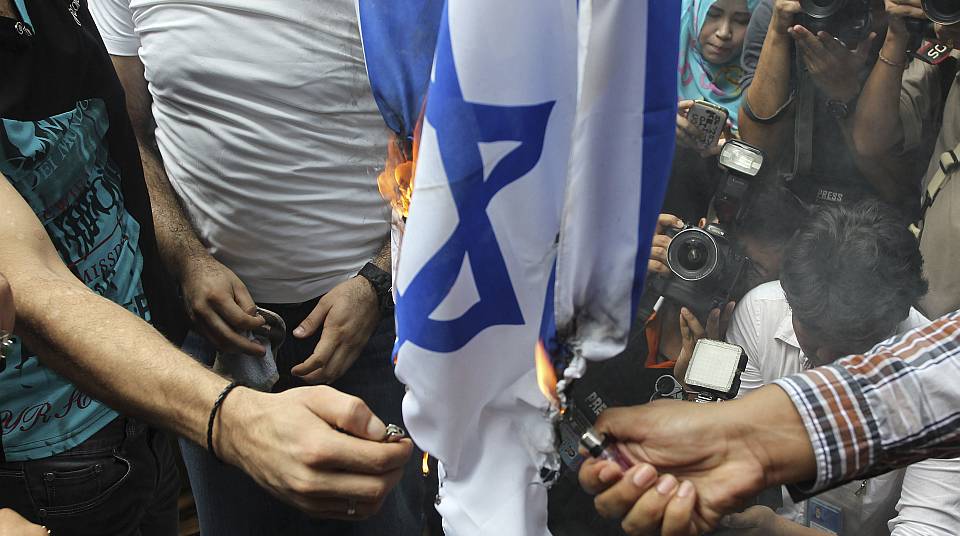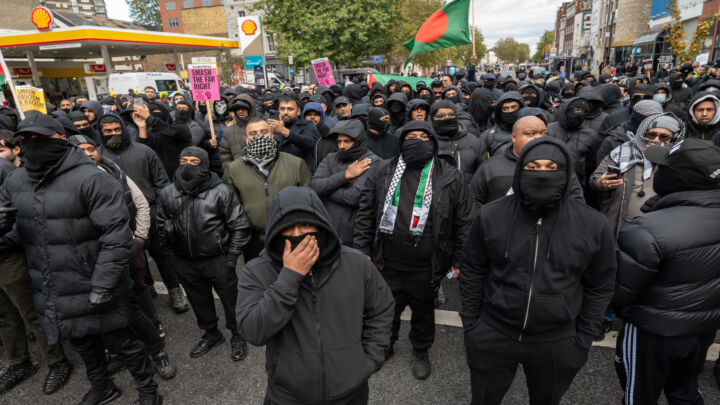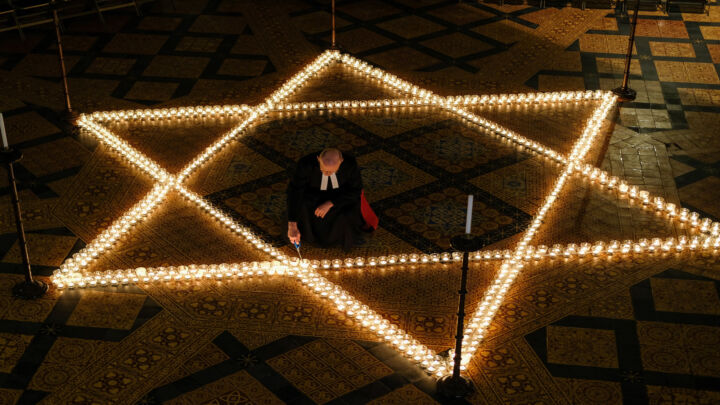There’s something very ugly in this rage against Israel
The line between anti-Zionism and anti-Semitism gets thinner every day.

Want unlimited, ad-free access? Become a spiked supporter.
Why are Western liberals always more offended by Israeli militarism than by any other kind of militarism? It’s extraordinary. France can invade Mali and there won’t be loud, rowdy protests by peaceniks in Paris. David Cameron, backed by a whopping 557 members of parliament, can order airstrikes on Libya and British leftists won’t give over their Twitterfeeds to publishing gruesome pics of the Libyan civilians killed as a consequence. President Obama can resume his drone attacks in Pakistan, killing 13 people in one strike last month, and Washington won’t be besieged by angry anti-war folk demanding ‘Hands off Pakistan’. But the minute Israel fires a rocket into Gaza, the second Israeli politicians say they’re at war again with Hamas, radicals in all these Western nations will take to the streets, wave hyperbolic placards, fulminate on Twitter, publish pictures of dead Palestinian children, publish the names and ages of everyone ‘MURDERED BY ISRAEL’, and generally scream about Israeli ‘bloodletting’. (When the West bombs another country, it’s ‘war’; when Israel does it, it’s ‘bloodletting’.)
Anyone possessed of a critical faculty must at some point have wondered why there’s such a double standard in relation to Israeli militarism, why missiles fired by the Jewish State are apparently more worthy of condemnation than missiles fired by Washington, London, Paris, the Turks, Assad, or just about anyone else on Earth. Parisians who have generally given a Gallic shrug as French troops have basically retaken Francophone Africa, stamping their boots everywhere from the Central African Republic to Mali to Cote d’Ivoire over the past two years, turned out in their thousands at the weekend to condemn Israeli imperialism and barbarism. Americans who didn’t create much fuss last month when the Obama administration announced the resumption of its drone attacks in Pakistan gathered at the Israeli Embassy in Washington to yell about Israeli murder. (Incredibly, they did this just a day after a US drone attack, the 375th such attack in 10 years, killed at least six people in Pakistan. But hey, Obama-led militarism isn’t as bad as Israeli militarism, and dead Pakistanis, unlike dead Palestinians, don’t deserve to have their photos, names and ages published by the concerned liberals of Twitter.) Meanwhile, hundreds of very angry Brits gathered at the Israeli Embassy in London, bringing traffic to a standstill, clambering on to buses, yelling about murder and savagery, in furious, colourful scenes that were notable by their absence three years ago when Britain sent planes to pummel Libya.
Such are the double standards over Israel, so casually entrenched is the idea that Israeli militarism is more bloody and insane than any other kind of militarism, that many Western liberals now call on their own rulers to condemn or even impose sanctions against Israel. That is, they want the invaders and destroyers of Iraq, Afghanistan, Libya and elsewhere to rap Israel’s knuckles for bombing Gaza. It’s like asking a great white shark to tell off a seal for eating a fish. America must ‘rein in Israel’, we are told. ‘The international community should intervene to restrain Israel’s army’, says a columnist for the Guardian, and by ‘international community’ he means ‘a meeting of the UN Security Council’ – the Security Council whose permanent members are the US, UK and France, who have done so much to destabilise and devastate vast swathes of the Middle East and North Africa over the past decade; Russia, whose recent military interventions in Georgia and Chechnya suggest it is hardly a devotee of world peace; and China, which might not invade other countries but is pretty adept at brutally suppressing internal dissent. On what planet could nations whose warmongering makes the current assault on Gaza look like a tea party in comparison seriously be asked to ‘rein in’ Israel? On a planet on which Israel is seen as different, as worse than all others, as more criminal and rogue-like than any other state.
The double standards were perfectly summed up last week in the response to an Israeli writer who said in the UK Independent that Israel’s attack on Gaza and its ‘genocidal rhetoric’ made her want to burn her Israeli passport. She got a virtual pat on the back from virtually every British activist and commentator who thinks of him or herself as decent. She was hailed as brave. Her article was shared online thousands of times. This was ‘common sense from one Jew’, people tweeted. No one stopped to wonder if maybe they should have burned their British passports after Yugoslavia in 1999, or Afghanistan in 2001, or Iraq in 2003, where often more civilians were killed in one day than have been killed by Israel over the past week. Why should Israel’s bombing of Gaza induce such shame in Israeli citizens (or Jews, as some prefer) that burning their passports is seen as a perfectly sensible and even laudable course of action whereas it’s perfectly okay to continue bounding about the world on a British passport despite the mayhem unleashed by our military forces over the past decade? Because Israel is different; it’s worse; it’s more criminal.
Of course, Western double standards on Israel have been around for a while now. They can be seen not only in the fact that Israeli militarism makes people get out of bed and get angry in a way that no other form of militarism does, but also in the ugly boycotting of everything Israeli, whether it’s academics or apples, in a way that the people or products of other militaristic or authoritarian regimes are never treated. But during this latest Israeli assault on Gaza, we haven’t only seen these double standards come back into play – we have also witnessed anti-Israel sentiment becoming more visceral, more emotional, more unhinged and even more prejudiced than it has ever been, to such an extent that, sadly, it is now becoming very difficult to tell where anti-Zionism ends and anti-Semitism begins.
So in the latest rage against Israel, it isn’t only the Israeli state or military that have come in for some loud flak from so-called radicals – so have the Israeli people, and even the Jews. In Paris on Sunday, what started as a protest against Israel ended with violent assaults on two synagogues. In one, worshippers had to barricade themselves inside as anti-Israel activists tried to break their way in using bats and planks of wood, some of them chanting ‘Death to Jews!’. Some have tried to depict such racist behaviour as a one-off, a case of immigrants in France losing control. But on that big demo at the Israeli Embassy in London last week some attendees held placards saying ‘Zionist Media Cover Up Palestinian Holocaust’, a clear reference to the familiar anti-Semitic trope about Jews controlling the media. On an anti-Israel protest in the Netherlands some Muslim participants waved the black ISIS flag and chanted: ‘Jews, the army of Muhammad is returning.’
In the virtual world, too, the line between anti-Zionism and anti-Semitism has become blurrier during this latest Gaza conflict. When a Danish journalist published a photo of what he claimed to be a group of Israelis in Sderot eating popcorn while watching Israeli missiles rain on Gaza, it became a focal point of fury with Israelis – every newspaper published the pic and Amnesty tweeted about it – and it generated the expression of some foul views. Israelis (not Israel in this case) are ‘disgraceful’, ‘murderous, racist’, ‘inhuman scum’, ‘pigs’, etc, said angry tweeters. It wasn’t long before actual bona fide anti-Semites were getting in on this rage against Israeli people, with one racist magazine publishing the Sderot picture under the headline ‘Rat-Faced Israeli Jews Cheer and Applaud Airstrikes on Gaza Strip’. The speed with which what purported to be an anti-war sentiment aimed at Israel became a warped fury with Israeli people, and the ease with which demonstrations against Israeli militarism became slurs against or physical attacks on Jews, suggests there is something extremely unwieldy about fashionable anti-Israel sentiment, something that allows it to slip, sometimes quite thoughtlessly, from being a seemingly typical anti-war cry to being something much uglier, prejudiced and ancient in nature.
Such is the visceral nature of current anti-Israel sentiment that not only is the line between anti-Zionism and anti-Semitism becoming harder to see – so is the line between fact and fiction. As the BBC has reported, the wildly popular hashtag #GazaUnderAttack, which has been used nearly 500,000 times over the past eight days to share shocking photographs of the impact of Israel’s assault on Gaza, is extremely unreliable. Some of the photos being tweeted (and then retweeted by thousands of other people) are actually from Gaza in 2009. Others show dead bodies from conflicts in Iraq and Syria. Yet all are posted with comments such as, ‘Look at Israel’s inhumanity’. It seems the aim here is not to get to the truth of what is happening in Gaza but simply to rage, to yell, to scream, to weep about what Israel is doing (or not doing, as the case may be), and the more publicly you weep, the better, for it allows people to see how sensitive you are to Israeli barbarism. It’s about unleashing some visceral emotion, which means such petty things as accuracy and facts count for little: the expression of the emotion is all that matters, and any old photo of a dead child from somewhere in the Middle East – Iraq, Syria, Lebanon – will suffice as a prop for one’s public emotionalism.
How has this happened? How has opposing Israeli militarism gone from being one facet of a broader anti-imperialist position, as it was in the 1980s, to being the main, and sometimes only, focus of those who claim to be anti-war? Why does being opposed to Israel so often and so casually tip over into expressions of disgust with the Israeli people and with the Jews more broadly? It’s because, today, rage with Israel is not actually a considered political position. It is not a thought-through take on a conflict zone in the Middle East and how that conflict zone might relate to realpolitik or global shifts in power. Rather, it has become an outlet for the expression of a general feeling of fury and exhaustion with everything – with Western society, modernity, nationalism, militarism, humanity. Israel has been turned into a conduit for the expression of Western self-loathing, Western colonial guilt, Western self-doubt. It has been elevated into the most explicit expression of what are now considered to be the outdated Western values of militaristic self-preservation and progressive nationhood, and it is railed against and beaten down for embodying those values. It is held responsible, not simply for repressing the Palestinian desire for statehood, but for continuing to pursue virtues that we sensible folk in the rest of the West have apparently outgrown and for consequently being the source of war and terrorism not only in the Middle East but pretty much everywhere. A poll of Europeans discovered that most now consider Israel to be the key source of global instability.
This is where we can see what the new anti-Zionism shares in common with the old anti-Semitism: both are about finding one thing in the world, whether it’s a wicked state or a warped people, against which the rest of us might rage and pin the blame for every political problem on Earth.
Brendan O’Neill is the editor of spiked.
Picture by: Apichart Weerawong/AP/Press Association Images
£1 a month for 3 months
You’ve hit your monthly free article limit.
Support spiked and get unlimited access.
Support spiked – £1 a month for 3 months
spiked is funded by readers like you. Only 0.1% of regular readers currently support us. If just 1% did, we could grow our team and step up the fight for free speech and democracy.
Become a spiked supporter and enjoy unlimited, ad-free access, bonus content and exclusive events – while helping to keep independent journalism alive.
———————————————————————————————————————————–
Exclusive January offer: join today for £1 a month for 3 months. Then £5 a month, cancel anytime.
———————————————————————————————————————————–
Monthly support makes the biggest difference. Thank you.










Comments
Want to join the conversation?
Only spiked supporters and patrons, who donate regularly to us, can comment on our articles.